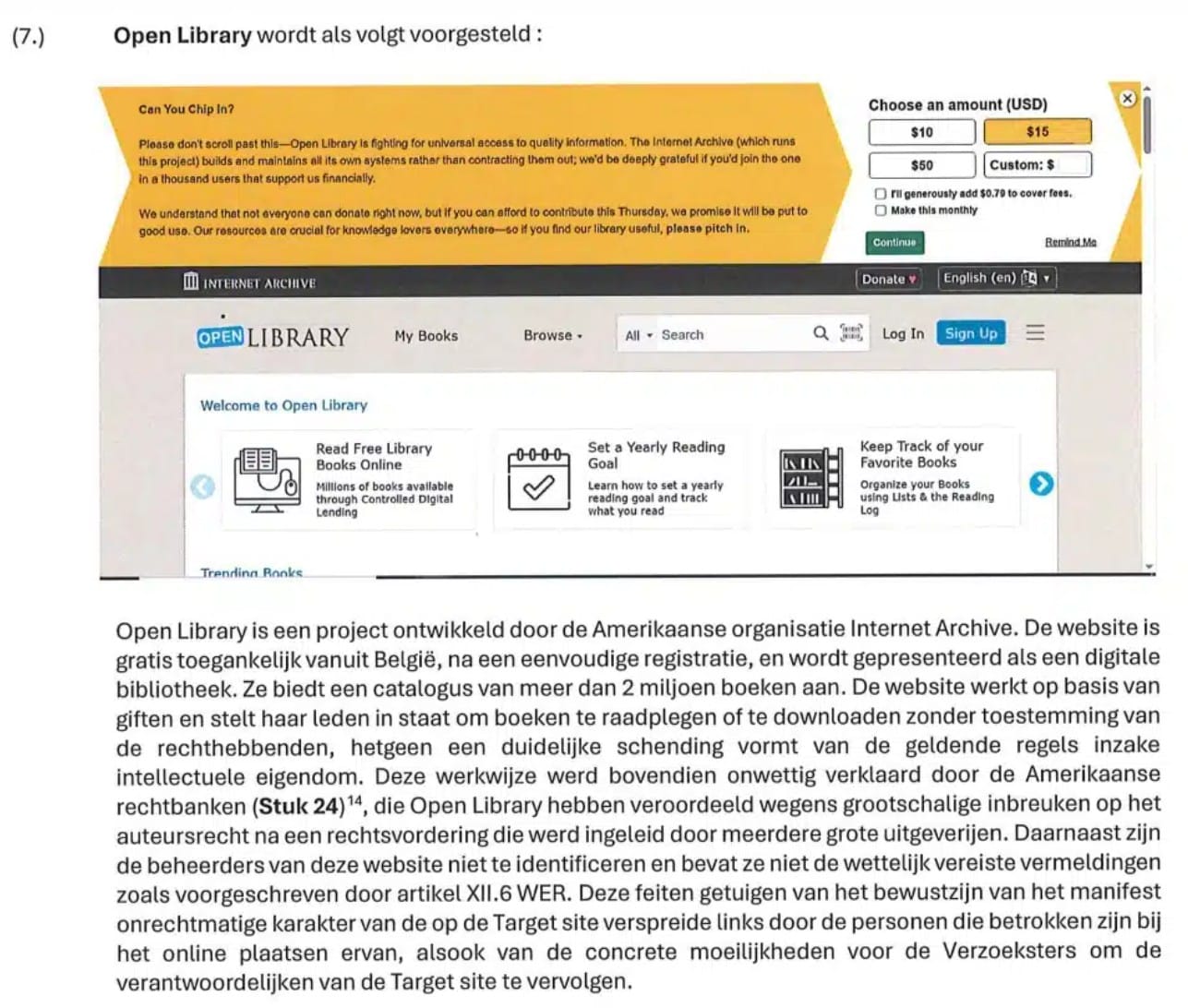 Traditional site-blocking measures that require local ISPs to block subscriber access to popular pirate sites are in common use around the world.
Traditional site-blocking measures that require local ISPs to block subscriber access to popular pirate sites are in common use around the world.
Note: this article was updated to add that Open Library does not appear to be actively blocked. More details here.
The aim is to deter piracy by making sites more difficult to find, but these measures are only partially effective.
More recently, site-blocking requests have begun to target other intermediaries. This includes DNS providers, such as Google and Cloudflare, which were ordered to block sites in France, Italy, and elsewhere.
A few months ago DNS blocking arrived in Belgium, where several orders required both ISPs and DNS resolvers to restrict access to pirate sites. This prompted significant pushback, most notably Cisco’s OpenDNS ceasing operations in the country.
Broad Blocking Order Targets Internet Archive’s ‘Open Library’
A new order, issued by the Brussels Business Court in mid-July, targets an even broader set of intermediaries and stands out for other reasons as well.
Requested by various publishing and author organizations, the order aims to block access to known pirate libraries including Anna’s Archive, LibGen, OceanofPDF, and Z-Library. In addition, it also targets the Internet Archive’s Open Library project.

Open Library was created by the late Aaron Swartz and Internet Archive’s founder Brewster Kahle, among others. As an open library its goal is to archive all published books, allowing patrons to borrow copies of them online.
The library aims to operate similarly to other libraries, loaning only one copy per book at a time. Instead of licensing digital copies, however, it has an in-house scanning operation to create and archive its own copies.

The Open Library project was previously sued by publishers in the United States, where the Internet Archive ultimately losing the case. As a result, over 500,000 books were made unavailable.
However, many other books remain available to patrons. The authors and publishers in Belgium argue that, since this is done without permission, the site should be blocked alongside Anna’s Archive, LibGen and Z-Library.
Clear and Significant Infringement
The rightsholders describe Open Library as a website where registered members of the public can easily access and download their books. This includes 1,542 works from the publisher Dupuis, over 5,000 works from the publisher Casterman, and many others.
According to the publishers, the operators of the Open Library are not easily identified, while legally required information is allegedly missing from the site, which they see as an indication that the site is meant to operate illegally.
This description seems at odds with the fact that Open Library is part of the Internet Archive, which is a U.S.-registered 501(c)(3) non-profit.

The publishers also reference a U.S. court order in favor of other publishers, which allegedly confirms the unlawful nature of Open Library.
The Brussels court, after reviewing these arguments and the submitted evidence, concluded that there was a prima facie case of “clear and significant infringement,” which justified granting a provisional blocking order against Open Library and the other targeted sites.
Broad Blocking Order Targets ISPs, Search, Payments, and More
Internet Archive was not heard in this case, as the blocking order was issued ex parte, without its knowledge. This is remarkable, as the organization is a legal entity in the United States, which receives support from many American libraries.
The broad nature of the order doesn’t stop there either. In addition to requiring ISPs, including Elon Musk’s Starlink, to block the library’s domain names, it also directs a broad range of other intermediaries to take action.
This includes search engines, DNS resolvers, advertisers, domain name services, CDNs, and hosting companies. An abbreviated overview of the requested measures is as follows;
—
Search Engines
Google must remove the target sites from search results, deactivate related Google Ads, remove an infringing app from the Google Play Store, and block DNS requests for the associated domains.
Microsoft is ordered to remove the target sites from the “Bing” search engine and block related DNS queries.
Hosting, DNS, CDNs, and Domain Name Services
The following companies must terminate hosting, and deactivate or suspend the domain names of the target sites: Hostinger, GoDaddy, Amazon Web Services, SEDO, Cloudflare, Unmanaged Ltd, AlexHost, and Internet Archive.
Payment Intermediaries
These companies are ordered to suspend all payment services benefiting the target sites: Alipay (Europe), Cash App and Squareup Europe, and PayPal (Europe).
ISPs including Starlink
The following ISPs, active in Belgium, are required to implement DNS blocking measures: Telenet, Proximus, Mobile Vikings, Orange Belgium, Voo, DIGI Communications, Cybernet, EDPnet, CENTREA, Yoin, Tchamba Refinder, IPTelecom, United Mobile, SkyDSL Europe, Starlink Internet Services.
—
Given the broad nature of the order, pushback from some of the intermediaries is expected. The Internet Archive’s Open Library won’t be pleased either, as the order effectively blocks their service in Belgium, including all access to public domain content.
—
Update: After publication, a representative from Internet Archive informed us that they are not aware of any disruption to their services at this time.
The Open Library domain (openlibrary.org) doesn’t appear on the master blacklist of FOD Economie either, while several domains of the other four ‘target sites’ are included. We have reached out to the responsible authority in Belgium to get clarification on this discrepancy and will update the article if we hear back.
—
A copy of the order from the Business Court in Brussels (in Dutch) is available here (pdf)
From: TF, for the latest news on copyright battles, piracy and more.
Powered by WPeMatico
